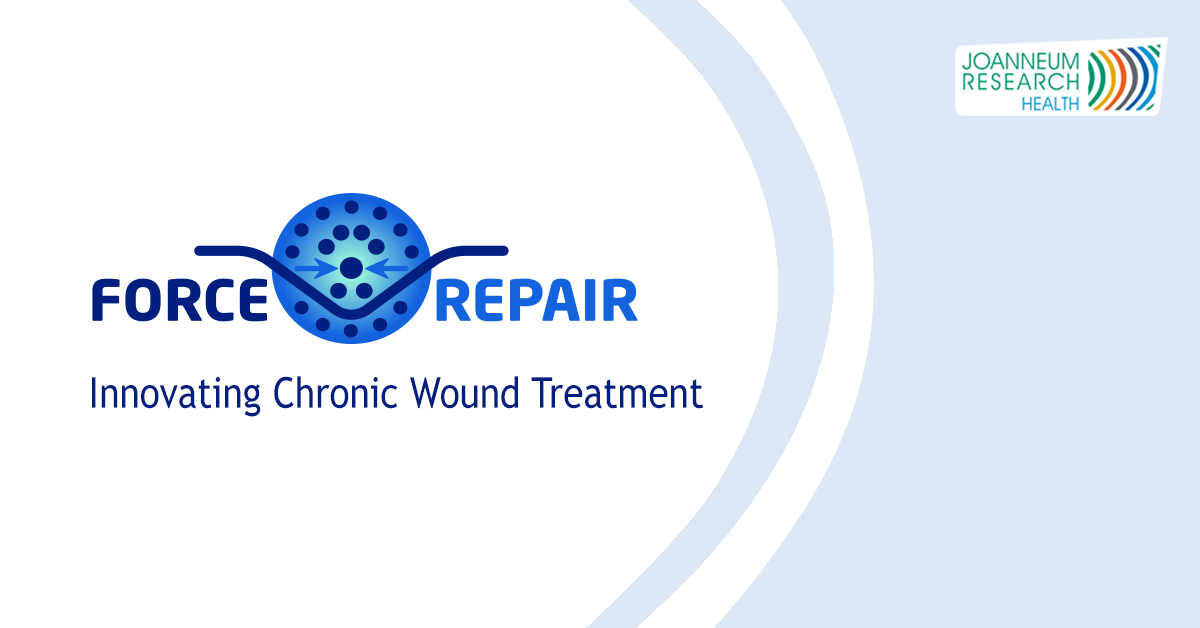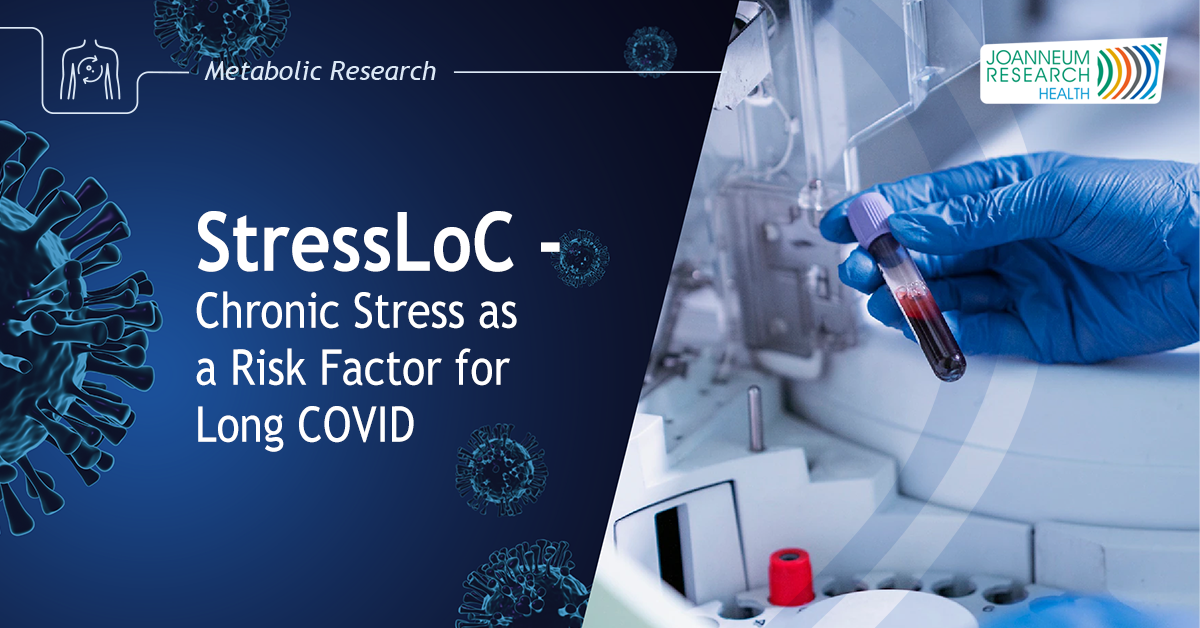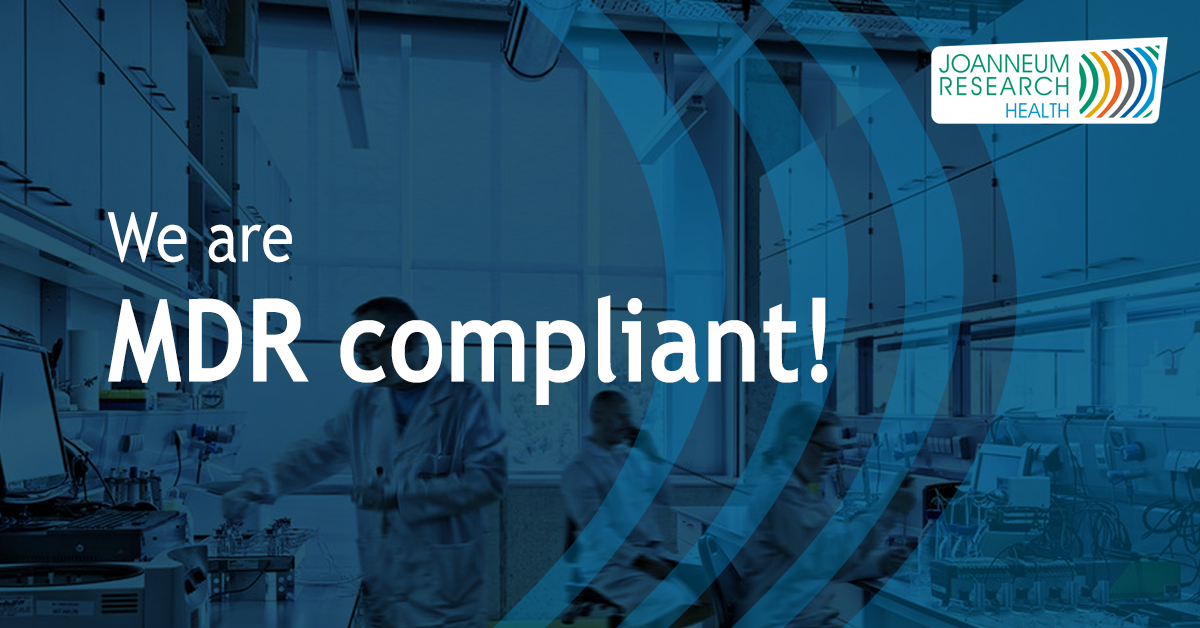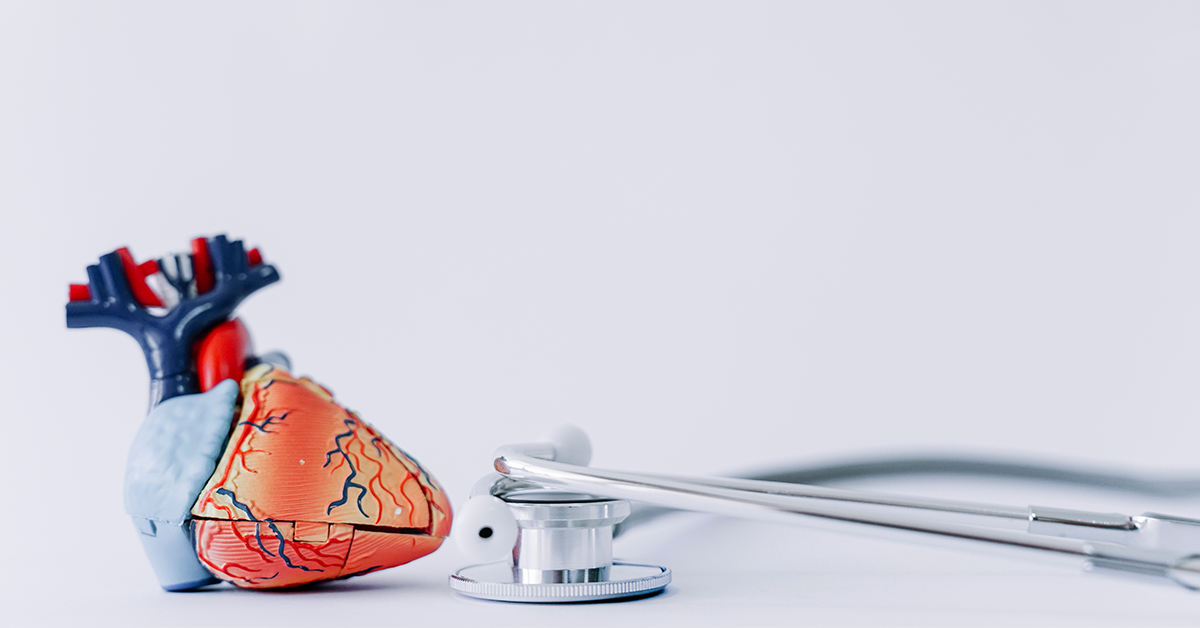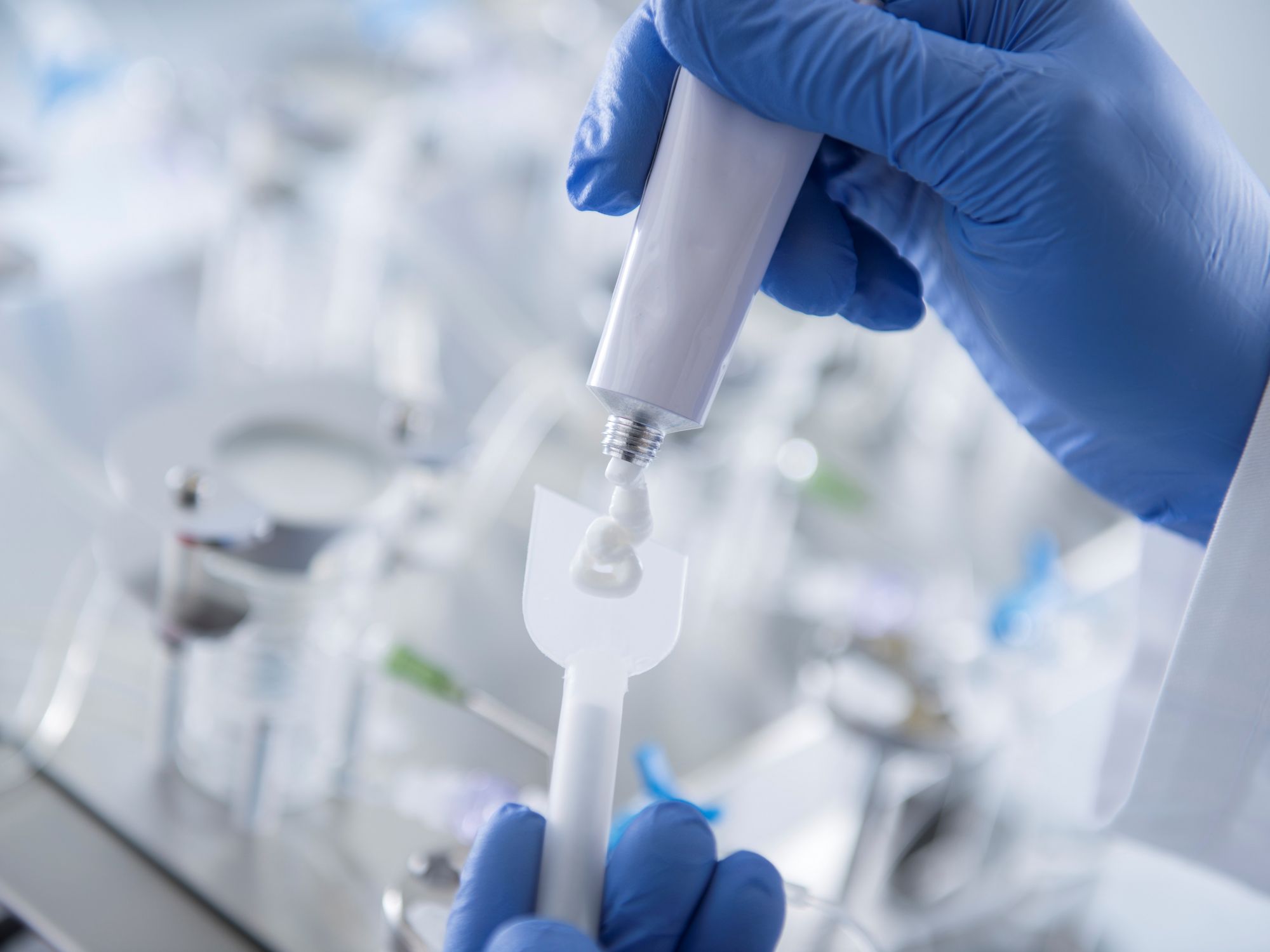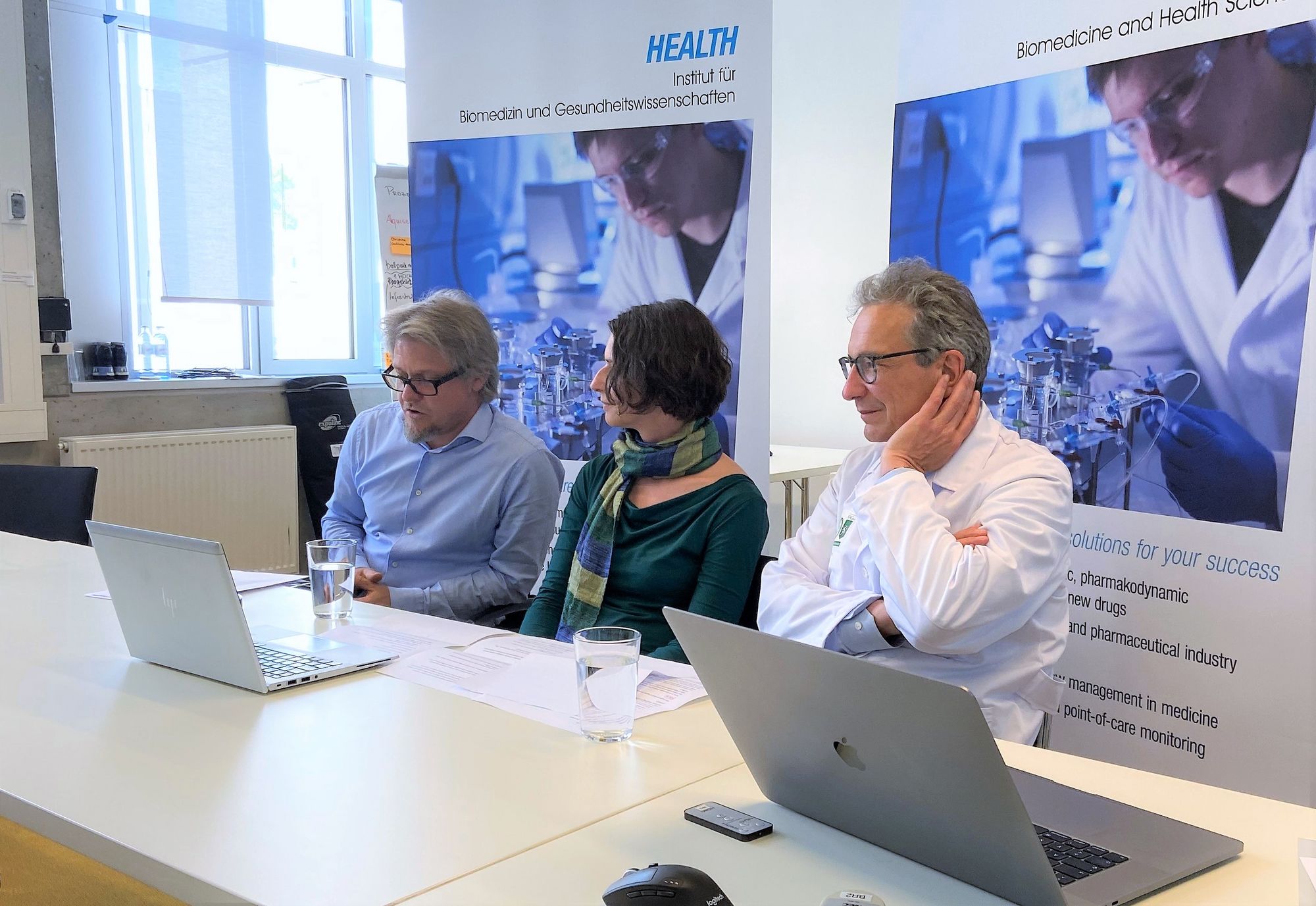MiWEAR: Transforming Health Monitoring
Thomas Birngruber and his research team are working in a large collaborative project to test a non-invasive device developed in the project. The research team is responsible for translational research from in vitro, ex vivo tests up to the final test in a clinical study and provide support in data interpretation for biomarker selection.
MiWear: https://miwear.eu/
Contact: Thomas Birngruber
FORCE REPAIR: Innovating Chronic Wound Treatment
Petra Kotzbeck and Thomas Birngruber joined a multidisciplinary team of 14 European partners to share and coordinate efforts, knowledge, and wound management expertise in a first kick-off event. “We finally met all consortium members in person at the kick-off event of the recently funded EU project FORCE REPAIR Wounds. The aim of the project and its international research team is to create a smart, multifunctional, and cost-effective 3D-printed wound dressing for innovative chronic wound treatment.” says Petra Kotzbeck, group leader at JOANNEUM RESEARCH COREMED –Centre for Regenerative and Precision Medicine. Chronic wounds affect up to 2% of the population in the industrial world with a significant increase expected. The healing of chronic wounds is challenging, and current therapies remain insufficient and costly. FORCE REPAIR aims to advance chronic wound management by developing a 3D-printed wound dressing to help control bacterial infection and inflammation. The novel biomaterials-based therapy will relieve skin tension and stimulate healing by combining innovative biocompatible technologies with pro-regenerative active ingredients.
FORCE REPAIR: https://lnkd.in/grS2Ufx7
Contact: Thomas Birngruber
Smart4Fabry: Nanotechnology to combat the metabolic disorder Fabry disease
Thomas Birngruber and his team at the HEALTH Institute of JOANNEUM RESEARCH are researching the efficacy of new drug formulations based on nanocapsules.Fabry disease is a rare hereditary disease in which organs are damaged because certain substances cannot be broken down in the body. Fabry disease is currently treated with enzyme replacement therapy, an expensive treatment that has to be repeated frequently. "The approach taken in the Smart4Fabry project uses a formulation that delivers the enzyme to the body packaged in nanocapsules. This allows the medication to circulate in the blood for longer, be distributed more effectively in the tissue and exert its effect over a longer period of time," says Birngruber. Researchers at the HEALTH Institute have compared various nanoformulations and measured the amount of medication that can be transported across the blood-brain barrier into the brain using cerebral open flow microperfusion.
Read more: https://lnkd.in/g4rUmbem
Contact: Thomas Birngruber
StressLoC: Chronic Stress as a Risk Factor for Long COVID
A clinical study at Med Uni Graz investigates whether chronic stress, which already existed before the infection with the coronavirus, can lead to the persistence of various disease symptoms over a longer period of time (Long Covid). Hair samples are used to measure the stress hormone cortisol and determine, the stress load of the last months. The study also investigates whether chronic stress has an influence on mental health after the illness and additionally measures stress-associated biomarkers, such as epinephrine in blood samples. These biomarkers require special analyses, which are carried out in the highly specialized laboratory of the Institute HEALTH of Joanneum Research.
Read more about the study: https://www.medunigraz.at/stressloc
Learn more about our laboratory infrastructure: Bioanalysis and Metabolomics Lab
Contact: Dr Anita Eberl
MDR compliance
We made it! Our current quality management system according to EN ISO 13485 as well as our class IIa medical device, the open-flow microperfusion catheter and all corresponding disposables, successfully achieved the transition to MDR compliance. We thank everybody in our team for their effort, paper-work and patience to achieve this major milestone in regulatory compliance at our institute.
Our current certificate is available here:
Medical research highlights: Metabolic differences in heart failure
A study led by Dr. Michael Paulus and PD Dr. Alexander Dietl of the University of Regensburg together with the metabolomics team (DI Elmar Zügner, Dr. Christoph Magnes) of Joanneum Research HEALTH has shown that the metabolism of tachycardiomyopathy (heart failure due to an irregular heart rate) significantly differs from other cardiomyopathies. The results of the study were published in the top scientific journal "Basic Research in Cardiology".
Read more about the study: https://doi.org/10.1007/s00395-022-00949-0
Learn more about the field of metabolomics: https://croservices.joanneum.at/services/metabolomics
Contact: DI Elmar Zügner, Dr. Christoph Magnes
Optimized Clinical Dermal Open Flow Microperfusion Study Design to Demonstrate Bioequivalence Based on Cutaneous Pharmacokinetics
The specific aims of this research include comparing in vivo cutaneous pharmacokinetic (PK) measurements by independent techniques such as dermal open flow microperfusion (dOFM), dermal microdialysis (dMD), or spectroscopic tomography; exploring the removal of the topical formulations at different time points and characterizing the resulting PK profiles of the test product and the reference standard; developing data analysis techniques; and identifying appropriate PK endpoints for the evaluation of topical BE. The outcomes of this research are expected to help US Food and Drug Administration (US-FDA) improve the efficiency of current BE approaches for topical generic products with compositional differences relative to the reference standard.
Read more about Optimized Clinical Dermal Open Flow Microperfusion Study Design to Demonstrate Bioequivalence Based on Cutaneous Pharmacokinetics here
This project is supported by the Food and Drug Administration (FDA) of the U.S. Department of Health and Human Services (HHS) as part of a financial assistance award U01FD007669 totaling $1,500,000 funded by FDA/HHS. The contents are those of the authors and do not necessarily represent the official views of, nor an endorsement, by FDA/HHS, or the U.S. Government.
JOANNEUM RESEARCH HEALTH is seeking a limited number of clinical partners to adopt the Clinical Dermal Open Flow Microperfusion ( dOFM™) development approach.
For the last decade, JOANNEUM RESEARCH HEALTH has been pioneering the use of our proprietary dermal Open Flow Microperfusion (dOFM™) technology to support the translational development of dermal drug products. By obtaining pharmacokinetics and pharmacodynamics data at or near the sites of action in skin, dOFM™ studies have been able to rapidly derisk/endorse drug development decisions. As we are seeking long-term, synergetic partnerships, we are open to innovative propositions to create a win-win arrangement with potential partners. Please forward your letter of interest (LOI) until December 31, 2022
For further inquiry and LOI submission, please visit our dedicated landingpage: Call for Partnership
RaDes GmbH collaborates with Joanneum Research HEALTH
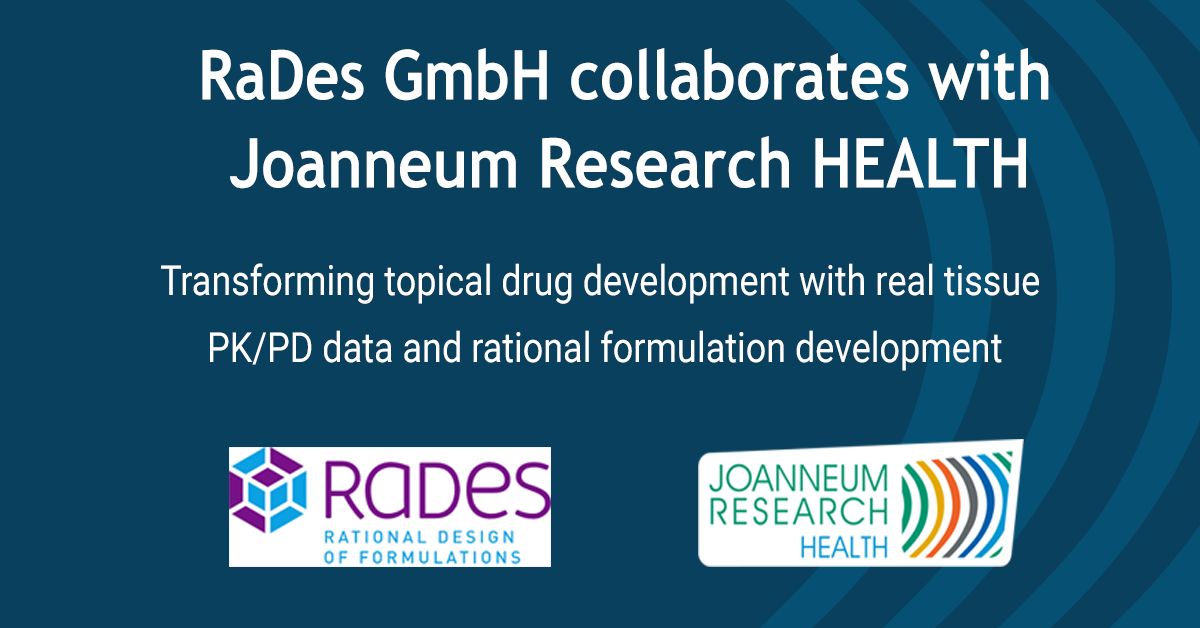
Joanneum Research HEALTH and RaDes GmbH are committed to accelerate novel therapeutic options for dermatology patients. Confirming our shared vison at the Skin Forum in Malmö, we would like to announce a collaboration of the formulation expertise of RaDes and the dermal Open Flow Microperfusion (dOFM) PK/PD technique of Joanneum Research HEALTH to support rational development of dermatology drug products.
In addition to pharmacokinetic (PK) profiling, HEALTHs unique and powerful dOFM allows pharmacodynamic (PD) profiling. Biological effects of the drug product can be monitored through determination of biomarkers. This offers our clients further de-risking in their development projects before entering into clinical trials.
New Publication "Advanced Online Monitoring of In Vitro Human 3D Full-Thickness Skin Equivalents“
Our new publication "Advanced Online Monitoring of In Vitro Human 3D Full-Thickness Skin Equivalents" is online.
Skin equivalents and skin explants are widely used for dermal penetration studies in the pharmacological development of drugs. Environmental parameters, such as the incubation and culture conditions affect cellular responses and thus the relevance of the experimental outcome.
However, available systems such as the Franz diffusion chamber, only measure in the receiving culture medium, rather than assessing the actual conditions for cells in the tissue. We developed a sampling design that combines open flow microperfusion (OFM) sampling technology for continuous concentration measurements directly in the tissue with microfluidic biosensors for online monitoring of culture parameters. We tested our design with real-time measurements of oxygen, glucose, lactate, and pH in full-thickness skin equivalent and skin explants.
Furthermore, we compared dermal penetration for acyclovir, lidocaine, and diclofenac in skin equivalents and skin explants. We observed differences in oxygen, glucose, and drug concentrations in skin equivalents compared to the respective culture medium and to skin explants.
More information:
JOANNEUM RESEARCH – HEALTH is a new certified laboratory of biocrates
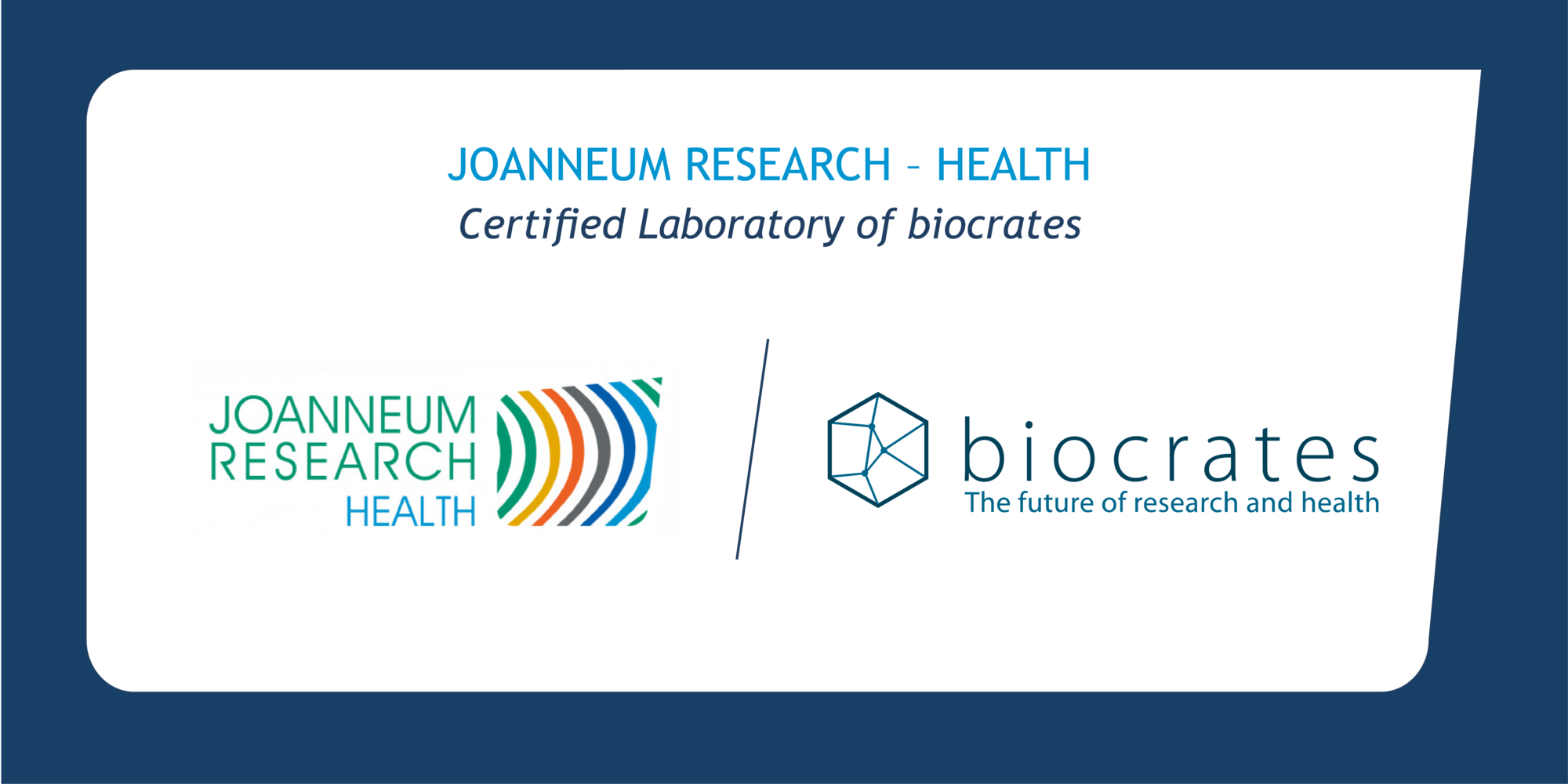
Biocrates Targeted Metabolomics Assays have become an international standard, so this certification is another important milestone in intensifying the cooperation between biocrates and JOANNEUM RESEARCH in the field of metabolomics. JOANNEUM RESEARCH now also offers analyses with certified high analysis quality based on the Biocrates Metabolomics Assays. Absolute quantification and thus comparability across studies in combination with the determination of up to 500 metabolites per sample characterize the implemented targeted metabolomics methods.
More information:
https://biocrates.com/certified-laboratories/
https://biocrates.com/our-technology/
Webinar: Cerebral Open Flow Microperfusion (cOFM) for in vivo Cerebral Fluid Sampling – Comparison of cOFM and Microdialysis
Dr. Joanna Hummer and Dr. Florie Le Prieult share insights into cOFM's use and utility in the broader neuroscience field and specifically for the development of drugs for neurodegenerative diseases.
Key Topics:
- How to perform in vivo sampling of cerebral fluid with intact blood brain barrier
- Established and new fields of application for cOFM
- Comparison of cOFM and MD when sampling a lipophillic drug
- Pharmacokinetics of therapeutic antibodies investigated with cOFM and MD
Information Material:
Live Recording
Presentation Slides
Presentation with Speaker Notes
Q&A Report
Follow up: Webinar - Best-practice study designs in metabolic research
Discover selected analytical methods for diabetes and obesity research by joining our latest webinar. Our speakers address a range of interesting topics, including the quantification of peptides that regulate metabolism and the use of stable isotope tracers in clinical trials. View the on-demand version for free and download the presentation slides with some additional comments from our experts Dr. Thomas Pieber, Dr. Reingard Raml and Dr. Christoph Magnes.
Webinar Resources:
Live Recording
Presentation Slides
Presentation Slides with Speaker Notes
Collecting antibodies and large molecule biomarkers in mouse interstitial brain fluid: MS vs cOFM

In the latest issue of the Journal MABS, Florie Le Prieult and colleagues from AbbVie Germany published latest results they observed after measuring concentrations of a monoclonal anitbody - trastuzumab - in the interstitial brain fluid (ISF) of awake and freely moving mice. The only currently available methods for extracting ISF, are Microdialysis (MD) and cerebral open flow microperfusion (cOFM).
For the first time, both methods were compared at a technical and performance level for the collection of large molecules in rodents. They found 10-fold higher absolute concentrations in cOFM samples compared to MD. In vivo recovery revealed an increased extraction of trastuzumab at low flow rates and a 6-fold higher absolute concentration at steady state than initially calculated with the in vitro recovery.
The authors conclude that the “standardization of these complex methods makes the unraveling of ISF concentrations attainable for various diseases and modalities, starting in this study with mAbs, but extending further in the future to RNA therapeutics, antibody-drug conjugates, and even cell therapies.”
Institute HEALTH celebrates GLP recertification
We are pleased to announce that JOANNEUM Research HEALTH has successfully renewed the GLP certification for its analytical laboratory, strengthening its positioning as a competent and professional partner for the pharmaceutical industry. Our analytical laboratory develops analytical methods in the research areas of bioanalytics and metabolomics and combines scientific competence with GLP/GCP standards for both complex research projects and drug development programs. We focus on the high quality of analytical results that are both traceable and tailored to the needs of our customers.
Download: GLP Certificate
Follow Up: Webinar - Informed decisions in dermal drug development with dOFM
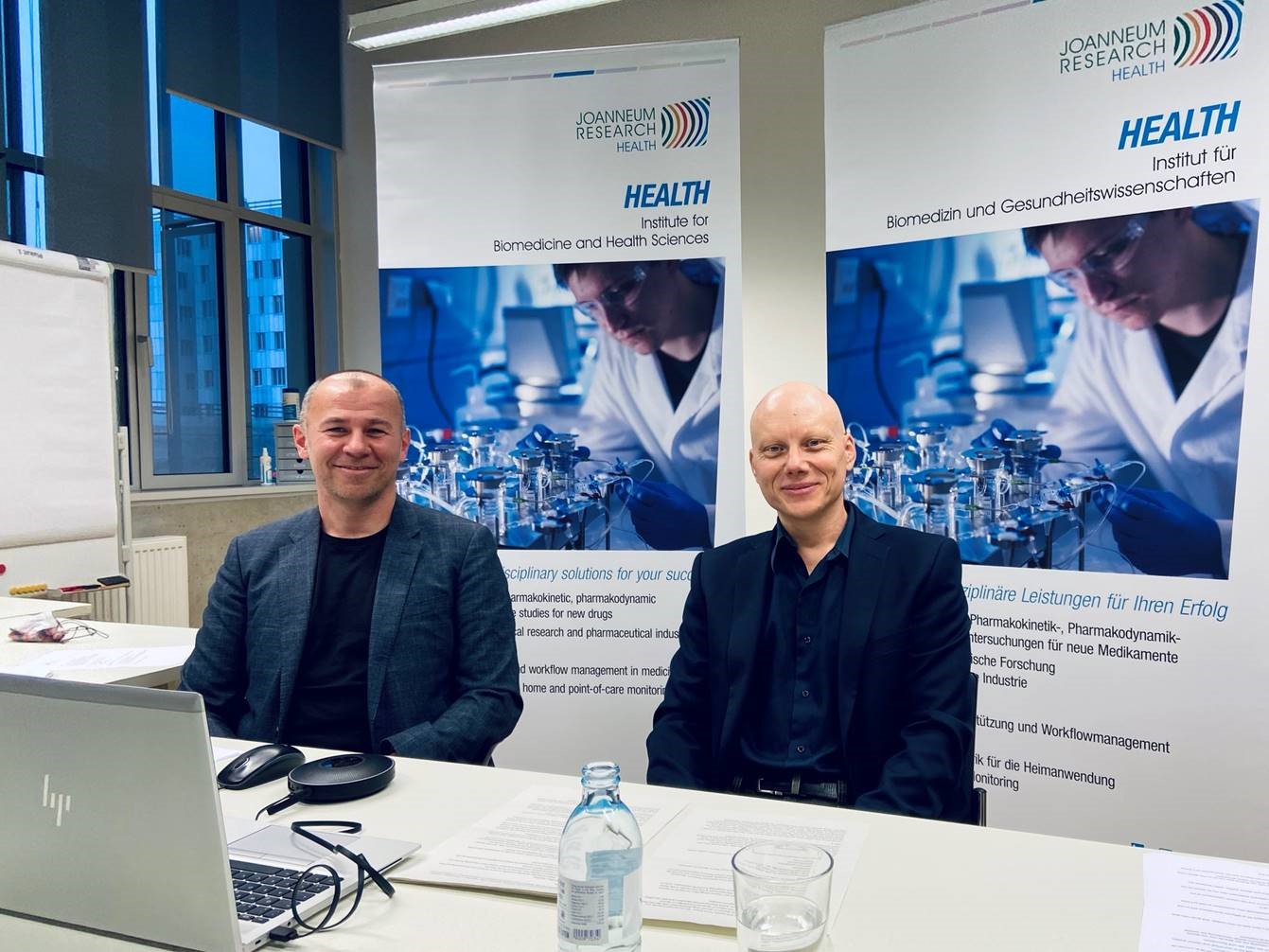
We are pleased to announce that we have prepared some useful content from our Webinar "Informed decisions in dermal drug development with dOFM". Please find below a collection of valuable insights, a comprehensive Q&A Catalogue and easy access to all relevant resources. Browse through a collection of questions raised by our listeners during the live webinar to see which topics are particularly relevant for our audience. Take a more detailed look at the slides and download the presentation including some additional notes from our dOFM experts.
Study results on a short-acting Insulin published
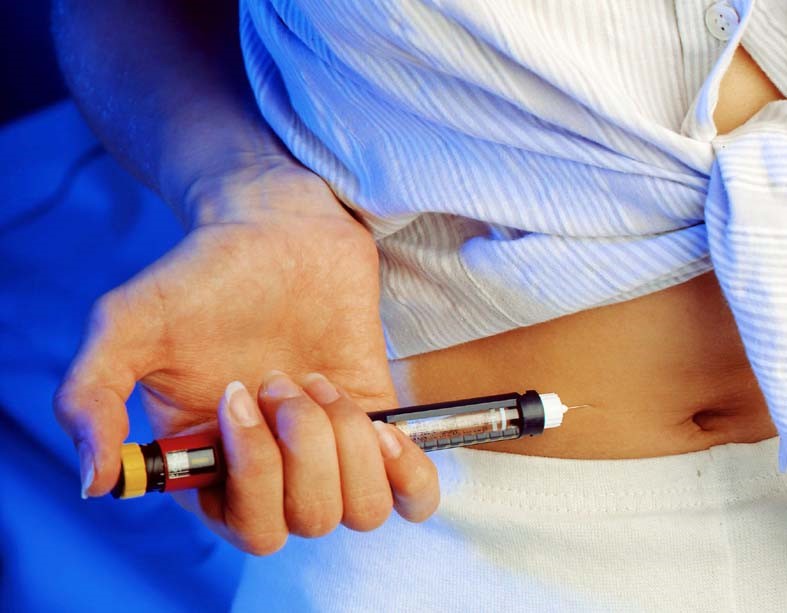
Credit: JOANNEUM RESEARCH
In a cooperative contract research project, HEALTH and Med Uni Graz have tested a new insulin in a clinical phase 1 study on behalf of Arecor. The study, in which HEALTH was responsible for insulin analysis, statistical evaluation, clinical data management, and quality management, showed that the new insulin enters the bloodstream more quickly and thus also acts faster. As a result, blood glucose control in type 1 diabetics is optimized and dangerous hyper- and hypoglycemia can be avoided. The study results are now published in the top-ranking Journal Diabetes Care.
This new type of fast-acting insulin is an important step in the development of an artificial pancreas. HEALTH is proud to support our clients with new developments to further improve the lives of people with diabetes.
Webinar - Informed decisions in dermal drug development with dOFM
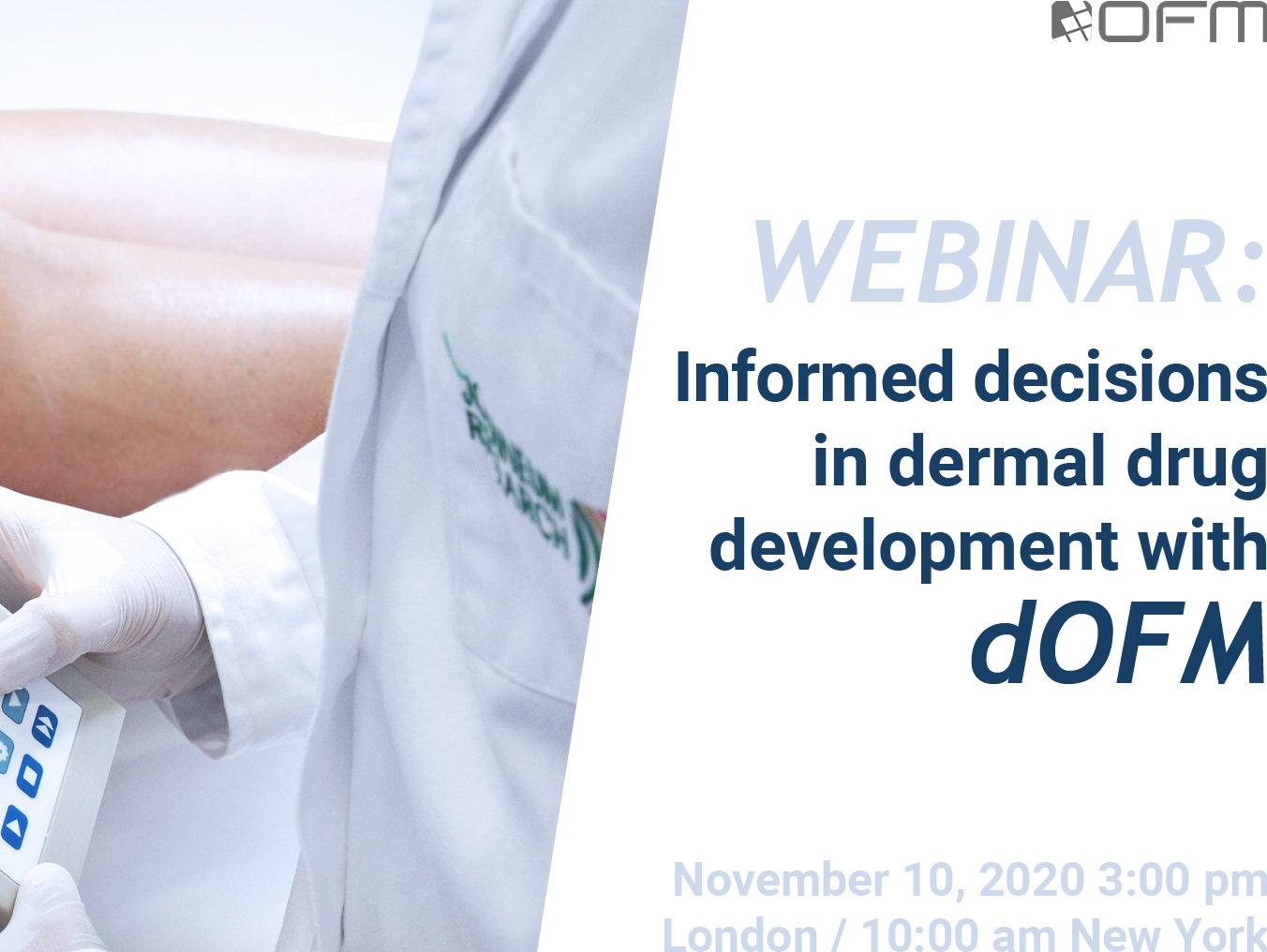
Dr Thomas Birngruber and Dr Frank Sinner will present valuable insights on improved formulation screening and local dermal PK and PD using dOFM sampling. This webinar will give you a concise overview of dOFM capabilities and introduce possible setups for preclinical and clinical studies. We will present several case studies for drug development, biomarker discovery and bioequivalence assessment. More information
Our experts will answer all your questions personally, such as:
- How can dOFM improve your dermal drug development?
- How to monitor local drug concentration in the dermis?
- How to perform a head to head comparison of formulations in the same subject?
- How to translate preclinical results directly into the clinical situation?

